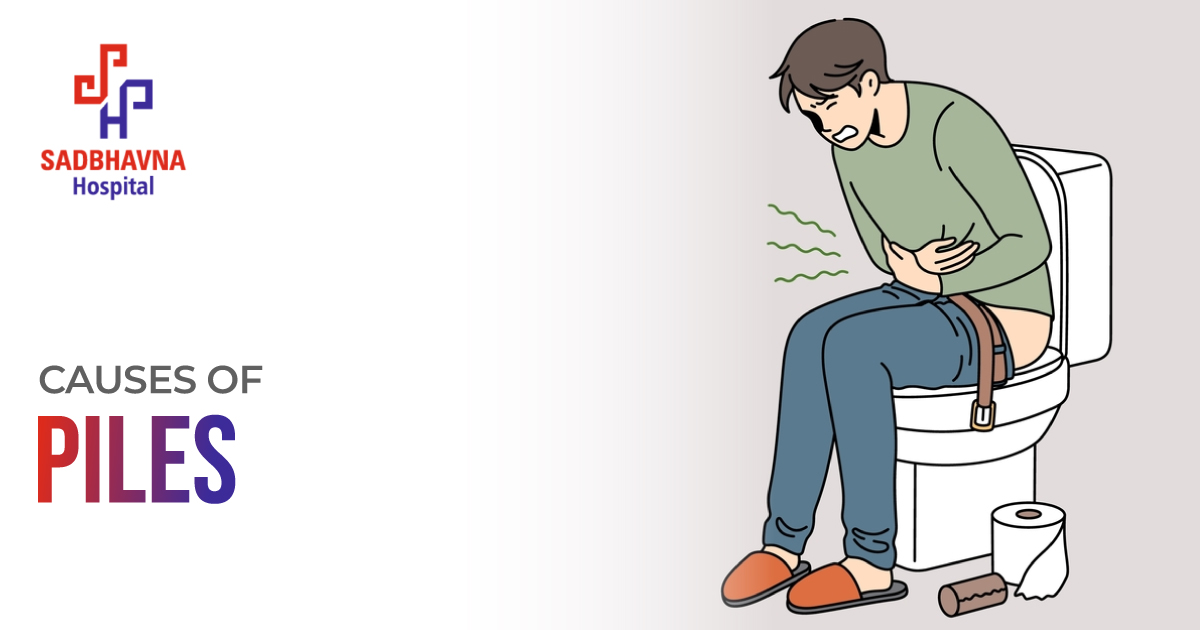If you’ve ever had to deal with piles or know someone who has, you’ll know the condition is troubling. They’re uncomfortable, frustrating, and sometimes downright painful. But have you ever wondered why piles occur? What causes piles to suddenly show up and ruin your day (or week)? Don't worry, let’s talk about it.
In this blog, the experts of Laser Piles Treatment in Ahmedabad at Sadbhavna Hospital have addressed your concern. Read further to know the major causes so that you get a clear picture of what happens.
Brief on Piles
Piles (also called hemorrhoids) are swollen veins located in your rectum or anus. These can develop inside (internal piles) or outside (external piles) of the area, and both can cause different symptoms—itching, bleeding, pain, or a lump you can feel.
They’re quite common, especially in adults over 45, but even younger people can get them too. The big question is: why?
So... What are the Causes of Piles?
The short answer? Too much pressure in the lower rectum. But that's one of the causes. There are several everyday habits and conditions that lead to that pressure and that’s where the causes of piles occur, similar to the factors that increase piles risk.
Let’s know the main reasons piles occur.
1. Chronic Constipation or Straining :
This is the most common cause of piles. When you’re constipated, you strain (find it difficult and painful) to pass stool. That extra pressure on the rectal veins causes them to swell which leads to piles.
What makes constipation worse?
- Not drinking enough water
- A low-fiber diet
- Ignoring the urge to go
- Lack of exercise
Fixing constipation is often the first step to dealing with piles.
2. Prolonged Sitting (Especially on the Toilet)
Spending 20+ minutes in the washroom scrolling through your phone? Many do that. But sitting for too long (especially on the toilet) can increase pressure on the anal/anus veins.
What about long sitting hours for work? That contributes too. A sedentary lifestyle doesn’t help either.
Get up, move around every hour, and don't use your phone in the washroom.
3. Pregnancy
Piles are super common during pregnancy, especially in the third trimester. How has this become one of the causes of piles? Because the growing uterus puts pressure on the veins in your pelvis. Also, hormones like progesterone relax your blood vessels, making them more prone to swelling.
The better part is that piles often go away after childbirth.
4. Heavy Lifting (Frequently)
If your job or workout routine involves lifting heavy weights, that can strain the lower body, including the rectal area. Done occasionally, it's usually fine. But frequent or incorrect lifting techniques can lead to piles.
Always lift with your legs, not your back. And don’t forget to breathe!
5. Obesity
Carrying extra weight, especially around the belly, increases abdominal pressure and become one of the causes of piles. That in turn puts stress on the veins in the rectum. Obesity is also linked to poor diet and sedentary habits. All these make the piles problem worse.
6. Low-Fiber Diet
Fiber is your gut’s best friend. Fiber helps move things in your digestive tract without hindrance. Without enough fiber, your stools become hard and difficult to pass, leading to straining.
Eat more :
- Fruits (like apples, berries)
- Veggies (especially leafy greens)
- Whole grains
- Legumes
7. Aging
As we get older, the tissues supporting our veins can weaken. That makes it easier for hemorrhoids to form. But lifestyle still plays a major role in whether or not piles develop.
8. Diarrhea
This might sound counterintuitive, but just like constipation, frequent diarrhea can irritate the rectum and cause piles. The constant wiping and inflammation are causes of piles.
Can You Prevent Piles?
Absolutely. While some causes of piles (like aging or pregnancy) are out of your control, many are not. Here’s what helps :
- Drink lots of water
- Eat a high-fiber diet
- Don’t sit too long (especially on the toilet!)
- Get regular exercise
- Don’t ignore the urge to go
- Lift weights properly (or avoid if not needed)
Even small lifestyle changes to prevent piles can make a big difference.
Piles are preventable and treatable. Many people deal with them, and most of the time, they can be managed or even prevented with simple changes. We provide proper diagnosis to find one or more causes of piles and then, minimally invasive and safe laser piles therapy.
The key takeaway? Pay attention to your body. Stay active, eat well, and don’t strain on the toilet. If piles do show up, talk to our specialist at Sadbhavna Hospital in Ahmedabad and take steps to fix the root causes.








